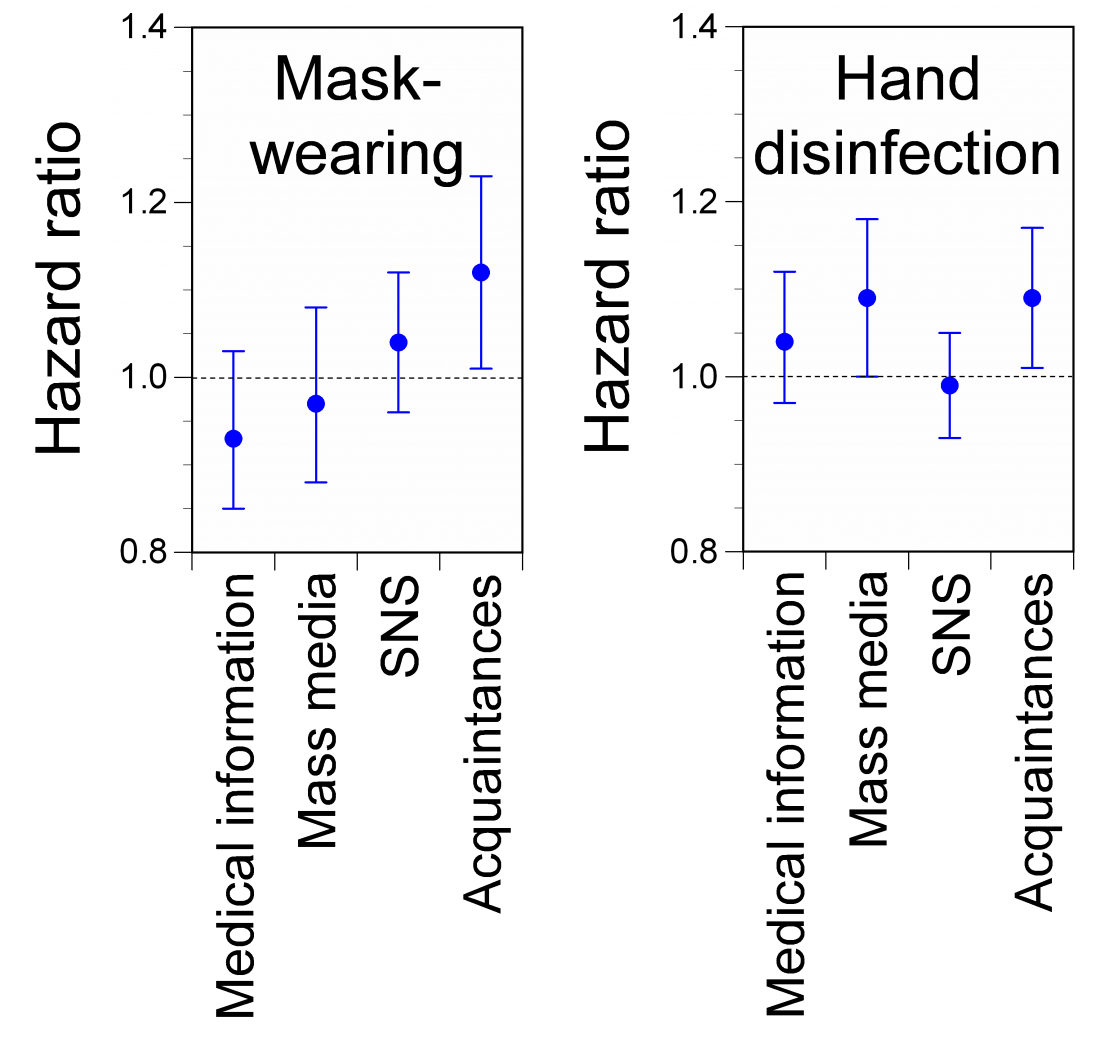Strength of association between information exposure and new implementation of mask-wearing and hand disinfection after the COVID-19 outbreak. Error bars represent 95% confidence intervals. A value greater than 1 indicates a strong positive association. The values were adjusted by covariate (gender, age, population density, dread perception of COVID-19, unknown perception of COVID-19, pathogen-avoidance tendency, and interest in COVID-19).
Researchers from Osaka University demonstrate that the steps we personally take to prevent the spread of disease depend on our own individual circumstances
Osaka, Japan – When making important decisions about disease prevention, who do you listen to? Medical institutions? Or perhaps the people around you? Your answer might reveal more about your personal circumstances than you would expect.
In a study published this month in the International Journal of Disaster Risk Reduction, researchers from Osaka University have revealed that, when taking steps to prevent the spread of disease, we are affected by certain factors surrounding us, such as where we get our information and whether we currently live under a pandemic.
In response to the coronavirus disease (COVID-19) outbreak, many countries implemented social measures, such as lockdowns, and mandated preventive behaviors, such as mask-wearing, for their residents. In Japan, behaviors that prevent infection, such as hand sanitizing and mask-wearing, have been left to individual discretion since the beginning of the COVID-19 outbreak.
“Since COVID-19 continues to circulate globally, it is important to determine the associations between individual characteristics and preventive behaviors to understand how to promote discretion-based preventive behaviors,” explains Michio Murakami, lead author of the study. “We are particularly interested in developing a risk communication strategy for promoting infection-preventive behavior in a timely manner.”
To address this, the researchers investigated the association between certain individual characteristics before and after the outbreak of COVID-19. Using 23 waves of panel data from January 2020 to January 2023, the researchers examined whether individuals consumed medical information on government or medical institution websites, whether they wore masks, and whether they disinfected their hands.
“The results were intriguing,” explains Asako Miura, senior author. “We found that, while medical information had the strong effect on infection-preventive behavior before the COVID-19 outbreak, people who exchanged information with acquaintances were more likely to newly start mask-wearing and hand disinfection after the COVID-19 outbreak.”
The researchers found that people who consumed medical information were more likely to wear masks and disinfect hands even before the COVID-19 outbreak. There were also slight differences in the rates of infection-preventive behavior and gender, with men less likely to implement preventive behaviors than women.
“Our findings clearly show that, in Japan, mask-wearing and hand-disinfection behaviors were the result of different information sources before and after the outbreak,” says Murakami.
Given that infection-preventive behaviors protect not only against COVID-19, but also seasonal and emerging infectious diseases, the insights from this study are a valuable contribution to public health. In particular, implementing the appropriate communication strategies for certain demographics can be an effective aid to disease prevention.
###
The article, “Exploration of factors associated with mask-wearing and hand disinfection in Japan after the coronavirus disease outbreak: A longitudinal study,” was published in the International Journal of Disaster Risk Reductionat DOI: https://doi.org/10.1016/j.ijdrr.2023.104107
About Osaka University
Osaka University was founded in 1931 as one of the seven imperial universities of Japan and is now one of Japan's leading comprehensive universities with a broad disciplinary spectrum. This strength is coupled with a singular drive for innovation that extends throughout the scientific process, from fundamental research to the creation of applied technology with positive economic impacts. Its commitment to innovation has been recognized in Japan and around the world, being named Japan's most innovative university in 2015 (Reuters 2015 Top 100) and one of the most innovative institutions in the world in 2017 (Innovative Universities and the Nature Index Innovation 2017). Now, Osaka University is leveraging its role as a Designated National University Corporation selected by the Ministry of Education, Culture, Sports, Science and Technology to contribute to innovation for human welfare, sustainable development of society, and social transformation.
Website: https://resou.osaka-u.ac.jp/en



